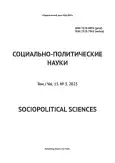Деятельность Интерпола и вопросы искусственного интеллекта
- Авторы: Загайнов М.Р.1
-
Учреждения:
- Финансовый университет при Правительстве Российской Федерации
- Выпуск: Том 15, № 3 (2025)
- Страницы: 93-99
- Раздел: Международные отношения, глобальные и региональные исследования
- URL: https://journal-vniispk.ru/2223-0092/article/view/313327
- DOI: https://doi.org/10.33693/2223-0092-2025-15-3-93-99
- EDN: https://elibrary.ru/SQNNBP
- ID: 313327
Цитировать
Аннотация
Автор, анализируя деятельность международных организации и вопросы искусственного интеллекта не может не обратиться к деятельности Интерпола, международная организация уголовной полиции, созданной для содействия сотрудничеству правоохранительных органов разных стран в борьбе с преступностью. Поскольку ее главная задача заключается в обмене информацией между странами-членами, координации расследований преступлений международного характера и обеспечении взаимодействия национальных полицейских служб, то очень важно прояснить вопрос с использованием искусственного интеллекта (ИИ) в данной работе. Не последнюю роль играет и проблема киберпреступности, которая приобретает уже глобальные масштабы. И здесь, достаточно актуально рассмотреть, как искусственный интеллект борется с искусственным интеллектом и какие инструменты для этого созданы. В этой связи цель данной статья является выявить роль искусственного интеллекта в деятельности Интерпола. Автор приходит к выводу, что искусственный интеллект играет важную роль в современных правоохранительных системах и для Интерпола благодаря своей способности обрабатывать большие объемы данных, выявлять закономерности и улучшать эффективность расследования преступлений. Использование технологий машинного обучения позволяет оптимизировать процессы анализа информации, выявления подозрительной активности и предотвращения угроз безопасности. Проекты, которые разрабатывает Интерпол, позволяют применить искусственный интеллект для расширения возможностей полиции путем автоматизации процессов обработки больших объемов данных, улучшения эффективности мониторинга и предсказания потенциальных угроз. Так, например, создание «Метавселенной», виртуальной штаб-квартиры, которая послужит иммерсионным учебным пространством для специалистов правоохранительных органов. И это только первые шаги в реализации этой идеи. Стоит отметить и важность разработки совместно с Межрегиональным научно-исследовательским институтом ООН по вопросам преступности и правосудия (ЮНИКРИ) «Инструментария для ответственных инноваций ИИ в правоохранительной деятельности». Таким образом, комбинация усилий Интерпола и возможностей искусственного интеллекта значительно повышает эффективность борьбы с международной преступностью, обеспечивая безопасность граждан и стабильность общества. Технологии позволяют оперативно реагировать на угрозы и минимизировать риски, делая мир безопаснее и защищеннее.
Полный текст
Открыть статью на сайте журналаОб авторах
Михаил Рудольфович Загайнов
Финансовый университет при Правительстве Российской Федерации
Автор, ответственный за переписку.
Email: ni22nn@mail.ru
ORCID iD: 0000-0002-8913-849X
SPIN-код: 7299-4810
кандидат экономических наук; старший преподаватель
Россия, МоскваСписок литературы
- Бадалов Ж. Искусственный интеллект как фактор международной безопасности: сравнительный анализ неореалистического и неолиберального подходов // Узбекистан – стратегия 2030 с точки зрения молодых ученых: экономика, политика и право. 2023. № 1. С. 150–165.
- Гришанина Т.А. Искусственный интеллект в международных отношениях: роль и направления исследования // Вестник РГГУ. Серия Политология. История. Международные отношения. 2021. № 4. С. 10–18.
- Острякова А.Ф. Правовое регулирование деятельности международной организации уголовной полиции (Интерпол) // Общество, право, государственность: ретроспектива и перспектива. 2023. № 2. С. 44–49.
- Пучкова Е.В., Морозов Р.М. Российский и зарубежный опыт использования искусственного интеллекта в деятельности правоохранительных органов // Право и управление. 2025. № 1. С. 337–341.
- Ситков А.С. Международное сотрудничество полиции в рамках Интерпола по противодействию киберпреступности и обеспечению кибербезопасности // Вестник Московского университета МВД России. 2022. № 5. С. 238–242.
- Ситников К.А. Международное полицейское сотрудничество: понятие, принципы, виды и формы // Административное право и процесс. 2025. № 2. С. 46–50.
- Федоренко С.П., Заикина А.А. Актуальные проблемы Интерпола и пути их решения // Интернаука. 2024. № 47-5. С. 37–39.
- Эриашвили Н.Д., Сарбаев Г.М., Иванова Ю.А. Теоретико-правовые основы противодействия международной преступности // Социально-гуманитарное обозрение. 2021. № 1. С. 43–50.
- Bhaso N., Marwala T. Artificial intelligence and international relations theories. Palgrave Macmillan Singapore, 2023. 165 р.
Дополнительные файлы








